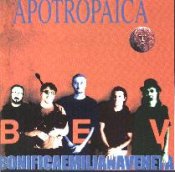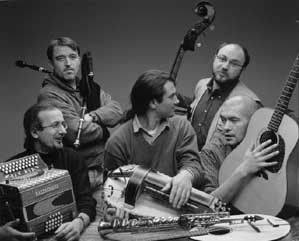FolkWorld article by Michael Moll:
BEV - BonificaEmilianaVeneta
About drainig marches and drinking music...
 North of the Alps you would seldom hear of folk music from Italy - unfortunately, because it seems like there are a lot of exciting bands to discover! Having introduced in FolkWorld already Ned Ludd with their own kind of folk rock and Gai Saber with young Occitanian music, in this issue we introduce another new, exciting, cool band based on Northern Italian traditions: BEV - BonificaEmilianaVeneta. Their debut CD is chosen as best album of 1999 by FolkWorld, and you have the chance to win one of three copies of this excellent work.
North of the Alps you would seldom hear of folk music from Italy - unfortunately, because it seems like there are a lot of exciting bands to discover! Having introduced in FolkWorld already Ned Ludd with their own kind of folk rock and Gai Saber with young Occitanian music, in this issue we introduce another new, exciting, cool band based on Northern Italian traditions: BEV - BonificaEmilianaVeneta. Their debut CD is chosen as best album of 1999 by FolkWorld, and you have the chance to win one of three copies of this excellent work.
BEV play mainly traditional Italian music from Emilia and Veneto, regions on the Northern Appennini mountains, stretching from the plans of Po river to the Alps. Their instruments are acoustic and traditional, still their technique melts the traditional way of playing with modern elements.
The band has some base in an older one called "La Piva dal Carner". "La Piva dal Carner", founded in 1991, enjoyed quite a popularity on the Italien roots scene, but disbanded in 1998 after two records and many concerts. Three of La Piva (Marco Mainini, Walter Rizzo, Claudio Pesky Caroli) started then together with two other musicians (Allessandro Mottaran, Luciano Giacometti) BEV.
 BonificaEmilianaVeneta - what does this complicated name mean? Says Alex: "Bonifica means the action to drain a marsh land, and transfer it into a cultivable or habitable one. We chose that name to describe a personal desire to live our traditions freely, without thinking too much about philology - in a way it is the need to "get away" from inflexible traditions. Emiliana Veneta indicates the roots of our music and the need never to forget them."
BonificaEmilianaVeneta - what does this complicated name mean? Says Alex: "Bonifica means the action to drain a marsh land, and transfer it into a cultivable or habitable one. We chose that name to describe a personal desire to live our traditions freely, without thinking too much about philology - in a way it is the need to "get away" from inflexible traditions. Emiliana Veneta indicates the roots of our music and the need never to forget them."
"Moreover BEV means "drink" in Emilian dialect, and that's just the way to use our music, and the pet name of English female name Beverly…do you know Bev?"
BEV feature an exciting range of instruments. All of them are traditional for this region, but, as Alex points out, they were used in different areas of the music tradition. Piva, the Italian bagpipe is the oldest, and is maybe from the 13th/14th century; the hurdy gurdy is from the 17th/18th century. Sax and acoustic guitar are obviously the most recent "traditional" instruments. Additionally, BEV also feature accordeon, manodlocello, bombarde, a traditional oboe and a double bass.
"It is a traditional feature of the 80s & 90s that all these are played together - at last they can play together, that's one of the advantages of our century."
 Their repertoire consists of traditional songs and dances, joined by new composition in traditional style. "We like very much to create melodies and lyrics by adding modern elements to the traditional archetype."
Their repertoire consists of traditional songs and dances, joined by new composition in traditional style. "We like very much to create melodies and lyrics by adding modern elements to the traditional archetype."
Most of the musicians of BEV did not grow up "in a all traditional Emilian or Venetian world". Mottaran and Giacometti had traditional accordion players in their families, and "our grannies were all roots music lovers and they were used to sing tunes. But that's not enough today to spread an attitude to play that kind of music."
BEV has a lot of influences from other kinds of music. All of them started to listen and play 70s popular music, like punk, new wave, country, rock, blues, jazz. "Until the day some things call you back to the ancient world that you belong to and you had not cared about."
The ancient world that you belong to - unfortunately a lot of the music of this world has been lost during this century, as it did in many other European countries. "Many of our traditions are lost or have nearly died. Sometimes you must base your research on very few things. For example, we have saved bagpipes, so we can create new ones - but we don't know much about the old playing technique because the last player stopped playing many years ago. Fortunately we have a great tradition in singing, having carried many fine tunes and the traditional way of singing into today's time." The Italian folk revival that started in the 6Os helped to preserve a lot of tradtional material.
BEV collect today their songs and tunes mainly from archives and books, while it is also still possible to find old people who can teach some tunes.
 The music from Emilia and Veneto has quite a lot of connections to other folk music traditions. Those links lead you to the music of other Northen Italian regions, but also further West: "You can find many dance tunes that sound a little bit like Galician or Asturian ones. Also, many of our ballads tell the same story you can hear in songs of many countries like Portugal, France or England."
The music from Emilia and Veneto has quite a lot of connections to other folk music traditions. Those links lead you to the music of other Northen Italian regions, but also further West: "You can find many dance tunes that sound a little bit like Galician or Asturian ones. Also, many of our ballads tell the same story you can hear in songs of many countries like Portugal, France or England."
Today you can find again more musicians and bands in Italy, still folk music is mostly neglected by record majors and politicians as well as by TV and press. A problem many other countries know too well from their own experience. While Alex is quite excited about the traditional material from his region, he thinks that the approach to traditional music needs to change in general. "Often there's a wrong way to think about tradition; we need to change our mind and take the traditions as a way to express ourselves, a way to talk about us, and not only as a way to talk about our ancestors. That's the way to let folk music grow up!"
And that is just the magic which is carried in the music of BonificaEmilianaVeneta - traditional music of today, with a lot of spirit and soul. It is the enthusiasm and honesty which makes this music on traditional instruments sound "modern".
Highly recommended!!!
 WIN BEV CDs!
WIN BEV CDs!
BEV's album "Apotropaica" is voted by FolkWorld as the best album of 1999. You have the chance to win one out of three BEV CDs. To take part in the competition, tell us what where FolkWorld's best albums of 1998 and 1997 in the annual Top Ten.
Answers until 12/02/2000 to FolkWorld.
Latest published CD: "Apotropaica", Label: Robi Droli; Enrosadira 0010
Further infos: BEV's homepage, e-mail folkbev@tin.it.
Photo Credit: BEV
Back to the content of FolkWorld Articles & live reviews
To the content of FolkWorld online magazine Nr. 12
© The Mollis - Editors of FolkWorld; Published 12/99
All material published in FolkWorld is © The Author via FolkWorld. Storage for private use is allowed and welcome. Reviews and extracts of up to 200 words may be freely quoted and reproduced, if source and author are acknowledged. For any other reproduction please ask the Editors for permission.
FolkWorld - Home of European Music

Layout & Idea of FolkWorld © The Mollis - Editors of FolkWorld
 North of the Alps you would seldom hear of folk music from Italy - unfortunately, because it seems like there are a lot of exciting bands to discover! Having introduced in FolkWorld already Ned Ludd with their own kind of folk rock and Gai Saber with young Occitanian music, in this issue we introduce another new, exciting, cool band based on Northern Italian traditions: BEV - BonificaEmilianaVeneta. Their debut CD is chosen as best album of 1999 by FolkWorld, and you have the chance to win one of three copies of this excellent work.
North of the Alps you would seldom hear of folk music from Italy - unfortunately, because it seems like there are a lot of exciting bands to discover! Having introduced in FolkWorld already Ned Ludd with their own kind of folk rock and Gai Saber with young Occitanian music, in this issue we introduce another new, exciting, cool band based on Northern Italian traditions: BEV - BonificaEmilianaVeneta. Their debut CD is chosen as best album of 1999 by FolkWorld, and you have the chance to win one of three copies of this excellent work.
 BonificaEmilianaVeneta - what does this complicated name mean? Says Alex: "Bonifica means the action to drain a marsh land, and transfer it into a cultivable or habitable one. We chose that name to describe a personal desire to live our traditions freely, without thinking too much about philology - in a way it is the need to "get away" from inflexible traditions. Emiliana Veneta indicates the roots of our music and the need never to forget them."
BonificaEmilianaVeneta - what does this complicated name mean? Says Alex: "Bonifica means the action to drain a marsh land, and transfer it into a cultivable or habitable one. We chose that name to describe a personal desire to live our traditions freely, without thinking too much about philology - in a way it is the need to "get away" from inflexible traditions. Emiliana Veneta indicates the roots of our music and the need never to forget them."